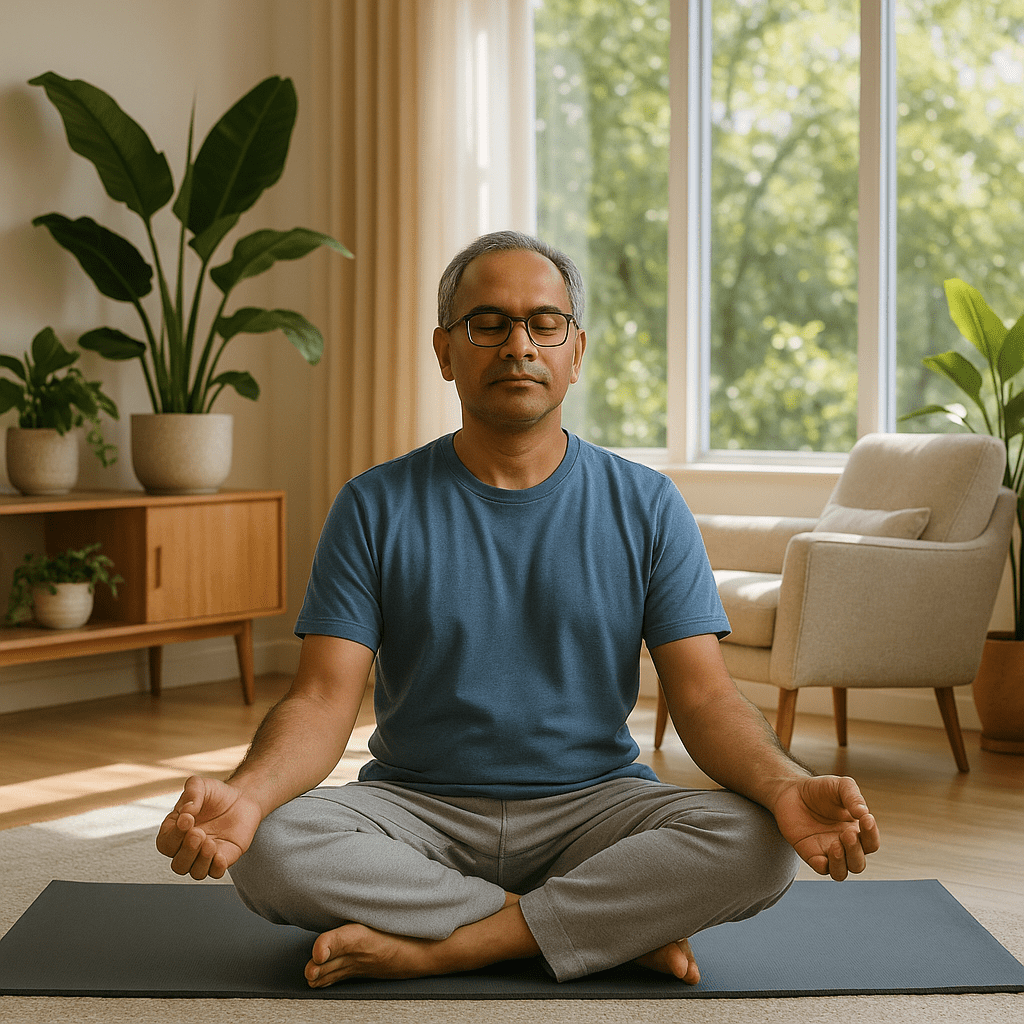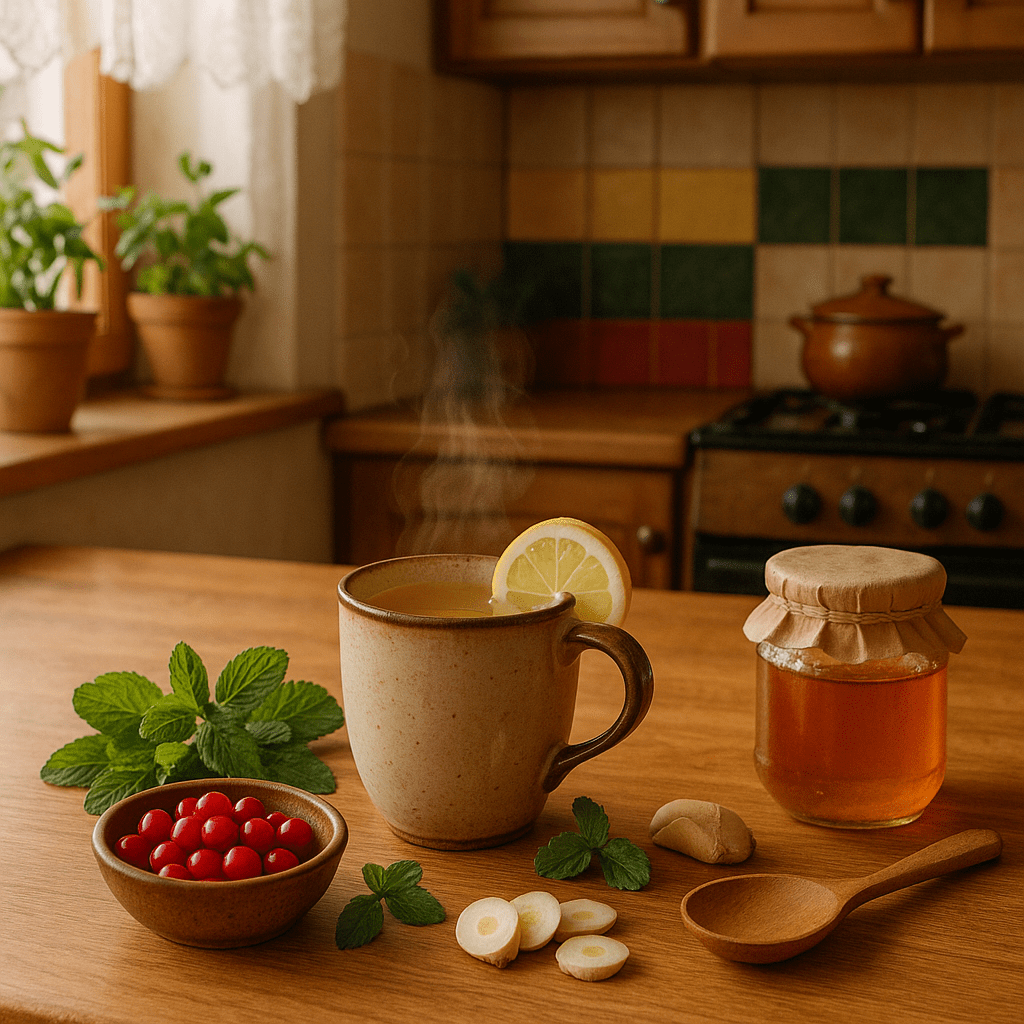In today’s world, full of stress, pollution, and a hectic lifestyle, a strong immune system has become one of the most important aspects of health. Our immunity is a complex defense system that protects the body from bacteria, viruses, and other pathogens. Although pharmacies are full of various preparations that promise to quickly boost immunity, more and more people are looking for natural ways to maintain and strengthen their body’s defenses.
Natural immunity boosting is not a one-time action, but a set of daily habits that allow the body to effectively fight infections. In this article, we will discuss ten science-based, natural ways that will help you strengthen your immune system, protect yourself from diseases, and improve your overall well-being. You will also learn about essential vitamins for immunity, which are necessary to maintain the body’s resistance.
Why is it important to strengthen immunity naturally
Natural immunity support is not just a short-term solution, but a long-term investment in health. Scientific research confirms that natural methods are not only safe, but also often more effective than aggressive medical interventions, especially when it comes to prevention.
Natural solutions usually work in a complex way – they not only strengthen the immune system, but also positively affect other body functions. For example, a balanced diet not only provides the body with the necessary substances for the immune system, but also supports normal digestive system activity, improves heart function, and helps maintain a healthy body weight.
The influence of lifestyle on the immune system is undeniable – studies show that our daily choices can determine up to 80% of our health. No “magic pill” can replace a comprehensive approach to health, which includes proper nutrition, sufficient sleep, physical activity, and psychological balance.
1. Quality sleep and rest
Sufficient and quality sleep is one of the most important factors in strengthening the immune system. During sleep, the body restores strength, produces and activates immune cells that fight infections.

Research shows that people who sleep less than 6 hours a night are 4 times more likely to get a cold than those who sleep 7 or more hours.
Sleep is so important for immunity that even one night of sleeplessness can reduce the activity of natural immune cells (NK cells) by up to 70%. These cells are essential for fighting viruses and cancer cells. In addition, rest is not only needed for a strong immune system at night – short breaks during the day, meditation or just sitting quietly in nature also help restore strength.
Tips for better sleep and rest
- Keep a consistent sleep schedule – go to bed and wake up at the same time;
- Create a calm sleep environment – a dark, cool and quiet room;
- Avoid electronic devices for at least an hour before bed;
- Enjoy a relaxing activity before bed – read a book, listen to relaxing music;
- Limit caffeine intake in the afternoon;
Ventilate your bedroom regularly.
Stress hormone control is also directly related to sleep – insufficient rest increases cortisol (a stress hormone), which suppresses the immune system. Therefore, quality sleep should be the first step in any immunity-boosting program.
2. Effective stress management
Chronic stress directly affects our immune system, suppressing its function and increasing inflammatory reactions in the body. When we experience stress, our body produces more cortisol, a hormone that can be beneficial in the short term, but its persistently increased levels weaken immunity.
Stress management is becoming an increasingly complex challenge in the modern world, but there are many effective ways to reduce its impact. Mindfulness practices, deep breathing exercises, and regular breaks from digital technologies can significantly improve psychological hygiene and strengthen the body’s resilience.

Stress and immunity are so closely linked that Harvard University researchers have found that relaxation practices can activate genes responsible for immune system activity. In addition to common stress-reduction methods, it is worth remembering natural supplements that can help reduce stress levels and maintain a healthy nervous system.
Tips for reducing stress in everyday life:
- Practice daily meditation for 10-15 minutes;
- Regularly devote time to your favorite hobbies;
- Limit the use of news and social networks;
Laughter and positive communication reduce stress hormone levels; - Try adaptogens – plants that help the body adapt to stress (e.g. ginseng, rhodiola);
- Plan regular breaks during the day.
3. Balanced diet: we eat to strengthen immunity
Proper nutrition is one of the essential factors determining the effectiveness of the immune system. Our body, by receiving all the necessary microelements and macroelements, can properly produce immune cells and ensure their optimal functionality. Scientists emphasize that a balanced diet should be varied, rich in antioxidants, vitamins and minerals.

Vegetables and fruits should make up the majority of our diet, as they are rich in vitamins C, A, E, which are strong antioxidants that help fight free radicals and strengthen immune functions. Red, orange and dark green vegetables are especially valuable – they are rich in carotenoids, which strengthen the body’s protective functions.
Omega-3 fatty acids, found in fatty fish (salmon, herring, mackerel), flax seeds, walnuts, reduce inflammatory reactions in the body and improve the functionality of immune cells. Regular consumption of these products helps maintain the balance of the immune system.
Immune-boosting foods
- Garlic and onions – contain allicin, which has antibacterial and antiviral properties;
- Citrus fruits – rich in vitamin C, which strengthens the immune system’s resistance;
- Spinach and leafy lettuce – rich in vitamins A, C, E and folic acid;
- Fermented vegetables and kefir – provide the body with probiotics that improve intestinal microflora;
- Ginger and turmeric – have anti-inflammatory properties;
- Nuts and seeds – rich sources of vitamin E, zinc and selenium;
- Berries – rich in antioxidants, especially black currants and blueberries.
Vitamin and mineral deficiencies can directly harm the functioning of the immune system, so it is important to ensure a sufficient amount of them through food, and if necessary – to supplement with immune-boosting products. Especially in the winter months, when natural sources of vitamins are less.
4. Stay physically active
Regular physical activity is one of the main natural ways to help strengthen the immune system. Moderate-intensity exercise improves blood circulation, which allows immune cells to move more efficiently through the body and detect and destroy pathogens faster. Scientists have found that physically active people are 25-50% less likely to get upper respiratory infections than those who live passively.
Movement and immunity are closely linked, as physical activity helps reduce chronic inflammation in the body. Studies show that even 20-30 minutes of daily movement can reduce markers of inflammation in the blood, which directly strengthens immune function. It is important not to exceed your limits – too intense training can temporarily weaken immunity.
Home workouts can be just as effective as at the gym, especially when it comes to strengthening immunity. Simple activities such as brisk walking, climbing stairs, yoga or stretching exercises can significantly improve the functioning of the immune system. Moderate-intensity, regular physical exercise, performed 4-5 times a week, is the most suitable.
How much activity is enough?
The World Health Organization recommends that adults devote at least 150 minutes of moderate-intensity aerobic activity per week (30 minutes for 5 days) or 75 minutes of vigorous-intensity training. In addition, it is advisable to perform muscle-strengthening exercises at least 2 times a week.
Practical tips for maintaining physical activity:
- Start with a small amount of activity and gradually increase it;
- Choose an activity that you enjoy – this will make it easier to stay motivated;
- Include physical activity in your daily routine – use the stairs instead of the elevator, walk;
- Take short active breaks during work;
- Exercise outdoors when possible – fresh air will enhance the positive effects;
- Find a training partner – this will increase the sense of responsibility.
5. Supplementation with vitamins and minerals
Vitamins are vital for immunity – they are involved in many processes that ensure the normal functioning of the immune system. Although most of the necessary nutrients can be obtained from a balanced diet, sometimes supplements are necessary, especially in cases of deficiencies or increased need.
Vitamin C is one of the best-known immune system boosters. It increases the production and functionality of white blood cells that fight infections. Its natural sources are citrus fruits, kiwi, strawberries, peppers. In case of increased need (during cold season or during stress), it is worth considering additional vitamin C intake.
Vitamin D deficiency is directly related to increased susceptibility to infections. This vitamin regulates more than 200 genes, including those responsible for the immune response. Lithuania, due to its geographical location, belongs to a region where vitamin D synthesis in the skin is insufficient for most of the year. Therefore, vitamin D supplements are often recommended, especially during the cold season.
Zinc supplements can also be useful for strengthening immunity. Zinc is involved in more than 300 biochemical reactions in the body and is essential for the production of immune cells. Its deficiency can significantly increase the risk of infections. Natural sources of zinc include pumpkin, meat, poultry, whole grains and legumes.
Other important trace elements for immunity:
- Selenium – a strong antioxidant, found in nuts (especially Brazil nuts), seafood;
- Vitamin E – protects cell membranes, abundant in vegetable oils, nuts, seeds;
- Vitamin A – essential for healthy mucous membranes, which are the primary defense against pathogens, found in egg yolks, liver, carrots;
- B vitamins – important for energy production in cells, including immune cells.
Before starting any supplements, it is recommended to consult a doctor who can assess individual needs and recommend appropriate doses. It’s also worth considering vitamin gummies for daily needs, especially if you have difficulty taking traditional pills.
6. Benefits of probiotics for gut and immune health
The connection between the gut and immunity is becoming increasingly recognized in the scientific community – about 70-80% of immune cells are concentrated in the gut. The gut microbiota directly affects our ability to fight infections and regulates the immune response. Therefore, probiotics become an important tool for the immune system in order to strengthen the body’s protective functions.
Probiotics are good bacteria that, once in the body, colonize the intestines and positively affect its microflora. They help maintain a healthy intestinal microbiome, which not only helps absorb nutrients, but also strengthens the protective intestinal barrier and regulates the activity of the immune system.
Natural sources of probiotics:
- Fermented dairy products – kefir, yogurt, sour milk;
- Fermented vegetables – sauerkraut, cucumbers;
- Kimchi and other fermented Asian dishes;
- Kombucha – fermented tea drink;
- miso paste is a Japanese fermented soy product.
Prebiotics also play an important role in maintaining a healthy intestinal ecosystem. These are insoluble fibers that are food for good bacteria. They are abundant in garlic, onions, leeks, green beans, bananas, oats. Regular use of prebiotics together with probiotics can enhance the effectiveness of probiotics.
The use of probiotics is especially recommended after a course of antibiotics, when the natural intestinal microflora is disrupted. In this case, probiotics help to restore the population of good bacteria faster and reduce the side effects of antibiotics. You can find more information about health-improving products on our health blog.
7. Prioritize personal hygiene and air quality
Personal hygiene and environmental cleanliness are simple but very effective ways to reduce the entry of pathogens into the body and thus facilitate the work of the immune system. Regular hand washing is one of the most important preventive measures – studies show that proper hand washing can reduce the risk of upper respiratory tract infections by up to 21%.
Virus prevention starts with simple habits, such as avoiding touching your face with unwashed hands. On average, a person touches their face about 23 times per hour, and the eyes, nose and mouth are the main routes through which pathogens enter the body. Conscious management of this habit can significantly reduce the risk of infection.
Ventilation is an often forgotten but very important aspect for maintaining immunity. Closed spaces concentrate not only viruses and bacteria, but also various pollutants, dust and allergens, which can cause inflammatory reactions and weaken the immune system. Regular ventilation of rooms (at least 10-15 minutes every 2 hours) can reduce the concentration of pathogens by up to 90%.
Practical tips:
- wash your hands with soap and water for at least 20 seconds, especially after returning from public places, before meals and after using the toilet;
- use alcohol-based hand sanitizers when soap and water are not available;
- regularly clean frequently touched surfaces at home (door handles, switches, telephones);
- ventilate rooms several times a day, even in winter;
- use a humidifier in winter to maintain an optimal humidity level of 40-60%;
- take care of indoor plants – some of them (e.g. ivy, dracaena) naturally purify the air;
- change bedding and towels regularly.
8. Limit bad habits
Bad habits have a direct negative impact on the immune system, reducing its ability to fight infections. The effect of smoking on immunity is particularly harmful – chemicals in cigarette smoke inhibit the function of immune cells, damage the mucous membrane of the respiratory tract and weaken the body’s natural defenses. Studies show that smokers are 2-4 times more likely to get infectious diseases than non-smokers.
Alcohol consumption, especially regular and heavy, also negatively affects the immune system. Alcohol impairs the ability of immune cells to fight pathogens, reducing their quantity and activity. In addition, it dehydrates the body, which inhibits the body’s natural ability to eliminate toxins and pathogens.
Physical inactivity is another common habit that weakens immunity. Prolonged sitting not only increases the level of inflammation in the body, but also reduces the circulation of immune cells in the bloodstream. Regular movement, even small, can significantly improve the functioning of the immune system.
Practical advice for those who want to give up bad habits:
- reduce alcohol consumption gradually, setting clear limits;
- for smokers – seek professional help to quit smoking, use nicotine replacement therapy;
- include active breaks in your daily routine, especially if you have a sedentary job;
- replace bad habits with good ones – go for a walk instead of a cigarette break;
- limit sugar intake – too much of it inhibits the activity of white blood cells;
- use apps that help you track your progress in quitting bad habits;
- look for support groups or contact specialists if overcoming addiction on your own is difficult.
It is important to remember that every positive change, even a small one, is already a step in the right direction. The main goal is not perfection, but consistent movement towards a healthier lifestyle.
9. Try Proven Traditional Methods
Over the centuries, humanity has accumulated a rich arsenal of traditional remedies to help strengthen immunity. Interestingly, many of these folk recipes are now scientifically studied and confirmed as effective. Natural health supplements, such as various herbs, spices and their mixtures, can be an excellent preventive measure against colds.
A mixture of ginger and honey is one of the most popular traditional methods of strengthening immunity.

Ginger contains gingerols and shogaols, which have anti-inflammatory and antioxidant properties. Honey has antibacterial properties and helps soothe a sore throat. Scientists confirm that this combination can help relieve inflammation and strengthen the body’s protective functions.
Garlic is one of the most powerful natural immunity-boosting products. The allicin it contains has antibacterial, antiviral and antifungal effects. Studies show that regular consumption of garlic (1-2 cloves per day) can reduce the frequency of colds by as much as 63% and shorten the duration of the disease.
Immunity-boosting measures, which have been used in Lithuania for centuries, include the consumption of cranberries and raspberries. Cranberries are rich in proanthocyanidins, which not only help protect against urinary tract infections, but also strengthen overall immunity. Raspberries contain salicylates, which act similarly to aspirin – they reduce fever and help fight inflammation.
Simple home recipes for immunity
- Ginger tea with honey – chop fresh ginger, pour boiling water, let it brew for 10 minutes, add a teaspoon of honey and a slice of lemon;
- Garlic and honey mixture – chop 4-5 garlic cloves, pour 2 tablespoons of honey, leave overnight, take a teaspoon in the morning;
- Cranberry compote – pour fresh or frozen cranberries with boiling water, add a little honey, a cinnamon stick;
- Echinacea tincture – 10-15 drops per day, especially at the beginning of the cold season;
- Black elderberry syrup – used as a preventive measure or at the first symptoms of a cold.
Although traditional methods can be an effective additional means of strengthening immunity, it is important to remember that they are not miracle drugs. Their effectiveness is best seen when used in conjunction with other ways to strengthen immunity – a balanced diet, sufficient sleep, physical activity, and stress management.
10. Adapt immunity strengthening to the family (for children and after antibiotics)
Immunity strengthening in children has its own characteristics – their immune system is still forming, so it is necessary to carefully select the appropriate methods. Children’s nutrition should be varied and balanced, rich in vitamins and minerals necessary for a growing body. Limited sugar consumption is especially important, as studies show that high sugar levels reduce the activity of white blood cells for up to several hours after consumption.
Regular daily routine habits help children not only feel safer, but also strengthen their immunity. Sufficient sleep (depending on age, 9-12 hours for children), daily physical activity outdoors and limited screen time are key elements that strengthen children’s resistance to diseases.
After taking antibiotics, the immune system is vulnerable, because antibiotics, while fighting pathogens, often destroy good bacteria in the intestines. Probiotics after antibiotics become necessary to restore the intestinal microflora. Studies show that taking probiotics can reduce the risk of antibiotic-related side effects (e.g. diarrhea) by up to 60%.
Practical advice for parents:
- Adjust vitamins and supplements for children according to their age – doses and formulations are different from adults;
- Involve children in food preparation – this way they will be more likely to try healthy products;
- Create outdoor play activities, even in the cold season;
- Use probiotics for at least 2-4 weeks after a course of antibiotics;
- Gradually increase physical activity after an illness;
- Ensure adequate fluid intake – dehydration weakens immunity;
- Monitor your child’s health and consult a doctor if you notice unusual symptoms
.
As for vaccination, it remains one of the most effective ways to protect against serious infectious diseases. The National Immunization Program establishes a calendar of recommended vaccinations for children, and adults are recommended to get vaccinated against seasonal influenza every year, especially for people in risk groups. It is always worth consulting with your doctor for individual recommendations.
Summary
Strengthening your immune system naturally is a holistic approach to health that encompasses many areas of your life. Each of the 10 ways discussed has its own contribution to overall immune system strengthening, but you will experience the greatest benefits when you apply them all together as a holistic healthy lifestyle strategy.
Start with small changes – first focus on getting enough sleep and managing stress, as these factors have a huge impact on your immune system. Gradually add other elements – a balanced diet, physical activity, vitamins and minerals. Remember that strengthening your immune system is not a short-term project, but an ongoing process that needs to become a natural part of your daily routine.
It is always a good idea to consult with a healthcare professional before making any significant dietary or lifestyle changes, especially if you have a chronic health condition or are taking medication. Individual needs may vary, so it is important to adapt these tips to your specific situation.
Those interested in additional ways to boost their immunity may want to look into essential vitamins for immunity or natural supplements that can help ensure optimal nutrient levels in the body.
Frequently Asked Questions (FAQs)
How quickly can I naturally boost my immune system?
Most natural changes, such as improved sleep or nutrition, begin to have a positive effect on the immune system after just a few weeks, but full-fledged immune strengthening is a long-term process.
Which vitamins are most important for immune health?
Vitamins C, D, E, and zinc are especially valuable for the immune system, but balance and variety in nutrient intake are key.
Are natural remedies like garlic and ginger really effective?
Recent research and traditional use both show that these remedies have immune-boosting properties, but they work best as part of a holistic approach, not as a quick fix.
Can children use the same immune-boosting strategies as adults?
Most healthy habits are suitable for all ages, but supplement dosages and products should always be age-appropriate and approved by a doctor.
What are the early signs of a weak immune system?
Increased frequency of colds, slow wound healing, fatigue, and digestive changes may signal that your immune system needs extra attention.

